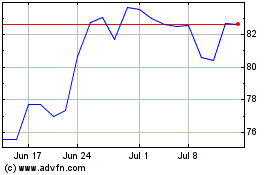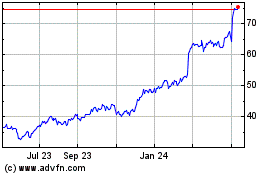By Jaewon Kang | Photographs by Theo Stroomer/Redux for The Wall Street Journal
Gourmet grocers are losing their edge as natural foods become
mainstream.
Supermarket chains and discounters are selling more fresh,
natural and organic foods at lower prices, drawing shoppers who
used to seek out those products at specialty grocers. Kroger Co.
has said it is now one of the nation's largest sellers of organic
produce, meat and other goods, while discounters Aldi and Lidl are
adding more fresh food and opening more U.S. stores.
Meanwhile, Whole Foods Market has cut prices on hundreds of
items including organic produce since Amazon.com Inc. acquired the
company three years ago.
As a result, specialty grocers are having a hard time convincing
customers to pay a premium to shop in their stores. And without the
revenue and reach of bigger chains, they have also been hesitant to
match price cuts or to invest in new services like delivery.
Regional chains Earth Fare, Lucky's Market and Fairway Market
have filed for bankruptcy in recent weeks. Shares in Sprouts
Farmers Market Inc. and Natural Grocers by Vitamin Cottage Inc. are
down respectively about 30% and nearly 50% over the past year.
"Differentiation can be ephemeral. Retail is an open book of
copycats," said Scott Moses, managing director at investment bank
PJ Solomon who is advising Lucky's and Fairway.
Fairway saw same-store sales slip 5% and lost $69 million over
the past year, according to court filings. The chain of 14
supermarkets in the New York area said competitors selling more
natural, organic and hard-to-find foods hurt demand for its gourmet
fare.
Lucky's recorded a same-store sales decline of 10% and a net
loss of $100 million over the past year, according to bankruptcy
filings. The Niwot, Colo.-based operator of 39 stores said rising
competition hurt its profitability, particularly in Florida, where
it was seeking to expand.
Earth Fare said in court documents that competition and spending
on store improvements had strained its business.
Mike Brewer, a 44-year-old business consultant who has shopped
at an Earth Fare store in Huntersville, N.C., since it opened in
2011, said he appreciated its relatively affordable selection of
natural products including veggie-pop snacks and grass-fed
beef.
"For a store closing, I'm pretty upset," he said.
He said he would turn to a Kroger-owned Harris Teeter
supermarket in his neighborhood when Earth Fare closes at the end
of February.
"What was special 10 years ago isn't special anymore," said Don
Fitzgerald, who teaches marketing at DePaul University and until
last year was a merchandising executive at Kroger's Mariano's
chain. Kroger owns more than 40 Mariano's stores in Illinois.
Some natural chains continue to add stores and enter markets to
find new customers. Lakewood, Colo.-based Natural Grocers by
Vitamin Cottage has added or relocated 11 stores in each of the
past two years, bringing its total to more than 150. But sales
growth has slowed to 1.9% during the latest quarter, down from 4.7%
in that period two years earlier, in part due to pressure from
bigger chains, Chief Executive Kemper Isely said.
"It's not growing as fast as it used to," he said in an
interview.
New Seasons Market, based in Portland, Ore., is trying to stand
out from the competition with hyperlocal products, Chief Operating
Officer Mark Law said. The chain of more than 20 stores in the
Pacific Northwest works with local chefs to prepare oven-ready
meals and buys dairy products from nearby farmers. Same-store sales
growth rate nearly doubled last year.
"Organic has been commoditized," Mr. Law, a former Whole Foods
executive, said. "You can't differentiate with your product mix
alone."
Other specialty grocers also are emphasizing services to stand
out. But offering better services can push up costs, executives
said.
"You not only have your cost of goods but you're trying to
provide a higher level of customer service to differentiate
yourself," Steven Mortensen, an adviser to private-equity firm
Yucaipa Cos., an investor in grocery chains. Yucaipa bought up West
Coast chains Ralphs, Quality Food Centers and Smith's under the
Fred Meyer banner, which it sold to Kroger in the 1990s. More
recent investments haven't fared as well. Yucaipa invested in Fresh
& Easy and Great Atlantic and Pacific Tea, chains that filed
for bankruptcy in 2015.
Some executives said Whole Foods became a tougher rival after
the chain started offering rapid delivery via Amazon. Green Aisle
Grocery closed its two Philadelphia stores in January after sales
decreased 30% over the past two years, co-owner Andrew Erace
said.
"I can't compete with that. I don't have the technology to
implement for our small shops," Mr. Erace said.
Write to Jaewon Kang at jaewon.kang@wsj.com
(END) Dow Jones Newswires
March 01, 2020 05:44 ET (10:44 GMT)
Copyright (c) 2020 Dow Jones & Company, Inc.
Sprouts Farmers Market (NASDAQ:SFM)
Historical Stock Chart
From Mar 2024 to Apr 2024

Sprouts Farmers Market (NASDAQ:SFM)
Historical Stock Chart
From Apr 2023 to Apr 2024
